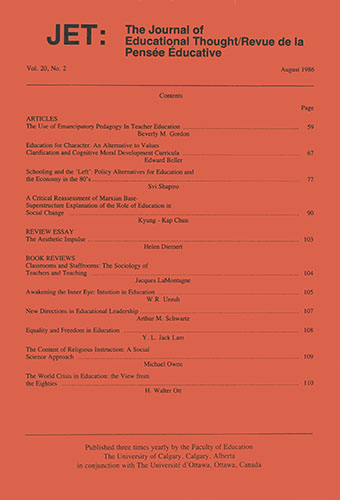The Use of Emancipatory Pedagogy In Teacher Education
DOI :
https://doi.org/10.55016/ojs/jet.v20i2.44176Résumé
Teacher education in the United States is historically grounded in a nineteenth century conception of education, influenced to some degree by social Darwinism, and based on an efficiency, scientific deterministic model of teaching and learning.
Using several examples of critical and emancipatory pedagogy drawn from the accounts of school teachers such as Warner, Brown, Searle, Shor and Freire, the author argues that through the study of these teachers, the methodologies and the lessons they teach, teachers receive what they need most "a for instance." These accounts can help all teachers make sense of, and hopefully envision and 'play with' ideas as they create, teach and reflect on their own lessons.
Téléchargements
Publié
Numéro
Rubrique
Licence
The Journal of Educational Thought retains first publication rights for all articles. The Journal grants reproduction rights for noncommercial educational purposes with the provision that full acknowledgement of the work’s source be noted on each copy. The Journal will redirect to the appropriate authors any inquiries for further commercial publication of individual articles. All authors wishing to publish in JET will be asked to fill in and sign a Consent to Publish and Transfer of Copyright agreement.
Authors must affirm that any submission to JET has not been and will not be published or submitted elsewhere while under considration by JET.

